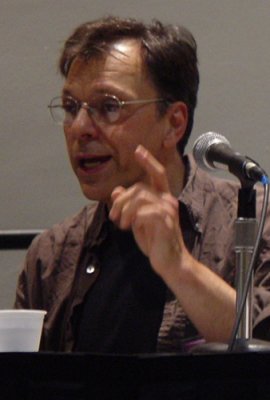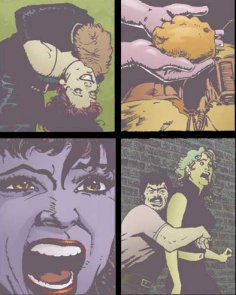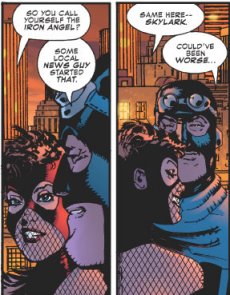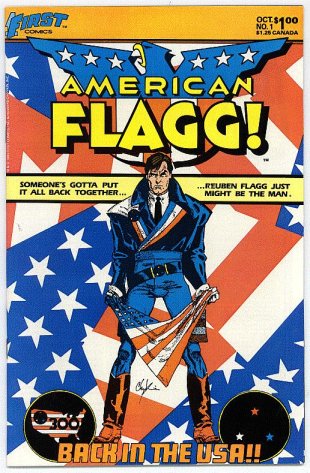An
Interview with Howard Chaykin, part two...
|
|
|
Howard
Chaykin, swearing to a confused fan that, yes, he
did draw the original ten issues of Star Wars...
|
Continuing our conversation,
I turned to Chaykin's debt to those who came before, and maybe
what lies ahead...
DM: Do you teach, or take up-and-comers
under your wing, at least? There's a lot of young guys that
can draw one element, but can't put the whole thing together.
Chaykin: I always have an assistant,
because frankly, I've been doing this long enough that there's
a lot of stuff I just don't feel like doing anymore. I always
have a guy working with me as sort of a Hound of the Baskervilles
or Brom Bones, riding behind me to keep me going.
I was an assistant to many of the great
lights in the generation before mine, and one of the things
you learn is that you can never give back to those guys
what you got from them. So your job is to pass it on to
the next generation.
I've had some great people working for
me. Everyone from Peter Kuper to Lynn Varley to Don Cameron,
who is now a sensational animation designer. I've got a
guy working for me right now who is absolutely sensational.
If I were living in New York City, in all
likelihood I would be teaching at the School of Visual Arts,
because I like the sound of my own voice. But I also think
I learned a great deal from teaching. It's one of those
great clichéd truisms that happens to be real.
I always find it difficult to do portfolio
review. Because what I expect of the material, what I understand
about the material, what I know about the material, has
so little relationship to what most guys who are in the
comic book business as professionals or even fans have.
It's like Venus and Mars.
One of the first things I do with any guy
I hire is give him Harvey Kurtzmann's Two-Fisted Tales
and Front-line Combat. I give him Milton Caniff's
Terry and the Pirates. It's historically the first,
and for my money greatest, example of what we do. More than
Prince Valiant or any of that other stuff. It's pure
core storytelling. I also feel that to a great extent Wash
Tubbs is a little too obscure for them. Terry and
the Pirates is more accessible than Wash Tubbs.
I mean it.
Buzz Sawyer is more accessible,
but by that time, he's gotten slick. But you look at Caniff,
and you see the evolution of what he did with Terry
in his first year and it's unbelievable. Take a look at
the dailies alongside the Sundays and you're going what
the hell is he doing? By 1937 and 38, everything's in place,
and he's just inventing the stuff that we do.
Kurtzmann is just the best writer in comics
in his time. He understood the relationship between narrative
visuals and captions. He was a word counter. His structure
is just mind-boggling.
But the problem is that both of these guys,
neither has the flash and dash of a Lou Fine and his descendants,
or Will Eisner and his descendants. But I think you can
learn more from those other guys, then apply the flash and
dash to narrative structure.
DM: You mentioned that you don't
get a lot of kids because you don't do The X-Men…
Chaykin: Why haven't I done The
X-Men?
DM: Well, there are definitely
mature themes running through your work. But would you ever
be tempted to do something that is more appropriate for,
shall we say, all ages?
Chaykin: I don't know. The fact
is that Challengers is going to confuse and confound
my audience because there's no sex in it. Sorry, kids.
|
|
|
Sure looks
like there's sex and violence to me..
|
It's more about paranoia and fear. It's
good-looking people. It could be a code book. It's definitely
not a mature readers book. Know that right up top.
I'm not sure that my drawing style is applicable
to that sort of thing. I was a teen-age dad. That's one
of secrets of the comics that they don't talk about in the
books. So I have grandchildren.
I look good. But I do have grandchildren.
I have a four and a half year old granddaughter, a year
old granddaughter and a three week old grandson.
I've been drawing for the eldest, because
she loves pirates. And I've tried to work in a style that's
fun for a four and a half year old. I'm not sure I have
those goods in me, if that makes any sense.
On the other hand, I might add, that it's
always amused me that so many pornographers would make great
children's book illustrators and vice versa. But that's
another story.
DM: You give me a good segue.
At Wondercon you made a joke about trying to get Black Kiss
made into a film.
Chaykin: That's no joke.
DM: Could American culture stand
such a thing?
Chaykin: I think Black Kiss
is one of the funniest things I've ever done, a darkly funny
comedy. I did at a turning point in my life. I turned the
point and now I'm done. There's no reason that film couldn't
be made. I don't think it would be a PG-13, but it could
be done anywhere from a hard R to an X.
You could do that film with a hard R, by
making implicit what is explicit. There's no reason it couldn't
be. And there have been a number of situations where it
was almost there. We've had a number of almosts, in the
first place with a semi-well-known Canadian actress, another
time with a very well-known American director. Hollywood
is filled with almosts.
I'm still hoping someday to get it happening.
That's one of the reasons that I like that it remains in
print.
DM: It's a far cry from your
early days drawing Star Wars. Not to dwell on that work,
but you have made the comment that Star Wars paved the way
for Ronald Reagan to be elected. Would you explain that?
Chaykin: What's weird is that I
made this comment several years ago. Then I saw a very similar
remark to that effect in a wonderful book called Seeing
Through The Movies.
I think that Star Wars and similar
films of the seventies made it possible for the electorate
to sort of put their minds on hold and go with their feelings,
more than they ever had before. It was a real turning point
in American culture.
It's another remark, I think in Power
& Glory, where the President's talking about the space
program being in trouble because people are more interested
in Star Wars than real stuff. Because the real stuff
is boring. I mean, they just don't look good; the suits
don't look cool. It's one of the reasons why, I think, in
the late seventies and early eighties there was a major
overhaul and redesign of spacesuits to make them look hipper.
I think that people have always liked a
man on a white horse, and Reagan was a man on a white horse.
He managed to portray Jimmy Carter as a creature of indecision,
and indecision is always perceived as an unheroic act. And
I think we're paying the price for that.
I am not, as you might guess, a Republican.
On the other hand, I find myself in the
curious position of actually considering the possibility
that there is actually a Republican politician in this country
who I would vote for. John McCain.
I have an immense respect for him on so
many levels. He's the most interesting politician alive,
certainly out there with a public face, that I've seen in
years. And I'm grateful that he's not running with Kerry.
I think that his personality, his anger,
his passion is enormously appealing.
DM: So let's tie this back to
Challengers of the Unknown. Do you think that the fictional
paranoia you've set up fits with today's situation?
Chaykin: Oh, absolutely. I explained
to somebody that Challengers was based on a line
from Gore Vidal. I'm a huge Gore Vidal fan, both as a writer
of fiction and as an essayist. I'm paraphrasing, but he
made a reference in a piece once to "…the people behind
the scenes who hire the men every four years who play our
president." And that stuck with me.
That's sort of what Challengers
is about: paying attention to the man behind the curtain
instead of letting it go and hoping everything will be fine.
It's about the machinations of the man
behind the curtain.
DM: What is it about comics that
has lured you back from the lucrative career doing television?
Chaykin: The money that you earn
from doing television comes at a price: heart, soul and
stomach.
When I left the show I was working on,
in the space of a couple of months I lost thirty-five pounds,
started sleeping better and found my head, my emotional
state, level of serenity and spirituality was greatly heightened.
I was no longer rage-filled. I was no longer berserk. I
was happy.
It finally all happened out of circumstance.
I left the show in June, and in Hollywood, by June the jobs
are all gone. The schedules are announced in mid-May, and
by June there's no work. The best that I could have hoped
at that point was to get a job come Thanksgiving. That's
about it.
|
|
|
Chaykin
proving his chops...
|
I found myself in the position of not having
to work, because that was part of my contract. But I wasn't
going to sit on my ass for six months because I don't do
that sort of thing. So I pitched a book to DC on a Friday,
and they bought it the following Tuesday. Which I have since
learned is a record. And that became Mighty Love.
I approached Mighty Love with enormous
fear, because I hadn't drawn anything of real volume in
years. I'd done short pieces here and there, the odd cover,
but it was an extended narrative. We're talking 96 pages.
And I discovered that my chops were in
better shape than they had any right to be. There were things
I never used to be able to do that I could do now, and there
were things that I used to be able to do that I could do
better.
I don't recommend taking ten years off
from your career, but it worked for me. And I discovered
that I really liked it. Half-way through the book, I was
talking to my wife and I said, "how would you feel if we
didn't have the kind of money that we're used to having?"
She said, "you're happier, you're healthier,
you don't make me crazy; I'll live with it." And that was
that. Now she's paying the price because she's working her
ass off trying to catch up, but she is an absolute bulldog
when it comes to work. Very much like me; the both of us
are very work-committed.
I decided to stay in comics. I'm still
available for other stuff, but I'm not actively insanely
pursuing it.
I'm pretty happy doing what I'm doing.
Life is good.
DM: Who currently working in
comics interests you?
Chaykin: I love 100 Bullets.
It feels like the work of one man, and for me there is no
greater compliment. It's a great synergy of talent.
I love what Dave Johnson is doing. I think
he's sensational in both black and white and in color. He's
one of the smartest artists I've ever seen.
I'm really digging Phil Noto's stuff.
I like this new guy, Leinil Yu. A whole
other way to think about the figure and the head. It's just
really nice.
I love what Alan Moore is doing on ABC.
I really love Tom Strong, because it's a great pastiche
of stuff that interests me. I really miss Top Ten.
I thought it was swell. I'm not a big fan of Promethea,
because I'm an American Jew and I just don't get it. It
has no resonance for me whatsoever. I love what Jim Williams
is doing, but I just don't get the book; it's too f*****g
English.
I love Adam Hughes' stuff. That good girl
stuff just kills me; it's really funny.
Who else? I'm hurting people's feelings.
I also have to say that I'm absolutely
stunned and delighted to see John Severin working. Two guys
that I was a big fan of were John Severin and Russ Heath.
|
|
|
Yes, I
see the Severin...
|
Nobody ever pointed out the huge influence
that John Severin had on me. I feel that to a large extent
American Flagg! is Alex Toth and Severin connected.
I've always been a fan, back to the Harvey
Kurtzmann days. Seeing the work he did for me on American
Century and for Judd Winick on Caper, f*****g
A!
The same for Russ. Did you see the second
half of Enemy Ace? My god…
On the basis of that, Russ is doing a huge
four-parter that I've written, which will hopefully be published
before he dies doing it. It's an astonishing piece of work.
It will completely reinvent the way people look at Russ
Heath. It's a year away at least, but it's that good.
DM: Would you like to give one
last pitch for Challengers before I go?
Chaykin: Buy the book or I'll kill
you. Just kidding.
People always accuse me of being cynical
when it's really being skeptical. They mistake an honest
statement for cynicism. We're surrounded by cynics that
will pander to the audience and tell them what they want
to hear just to get their attention.
Challengers, for me, was a difficult
book to do. It was a lot of fun to do. The response I've
gotten at the office has been extremely gratifying.
I think
it's going to be a book that a lot of people will be angered
by but delighted by as well. I had a great time with it,
and I think that the joy and fun I'm having with the material
comes through on the page. On every level, from the lettering
by Richard Starkings at ComicCraft, to the coloring by Michelle
Madsen, who is going to break out and become a monster because
of the work she's done here.
I'm really excited and looking forward
to seeing it on the stands. For you it's every month on
the newsstand, for me it's every morning on my desk. I've
been living with this for a long time. The first issue just
went to the printer yesterday. I'm in the process of penciling
issue four, and I've written to issue six. My reference
file is just getting bigger and bigger.
I love
this stuff. Read my book.
And
so, Howard said good-bye with the vague threat that he would
be appearing EVERYWHERE this summer in San Diego. There
would be no escaping Howard Chaykin, though he chastised
my youth for calling it Comic-Con. To the older pros, it's
the San Diego Show.
No
matter what you call it, I look forward to seeing Chaykin
there with whatever he has to offer.
|









